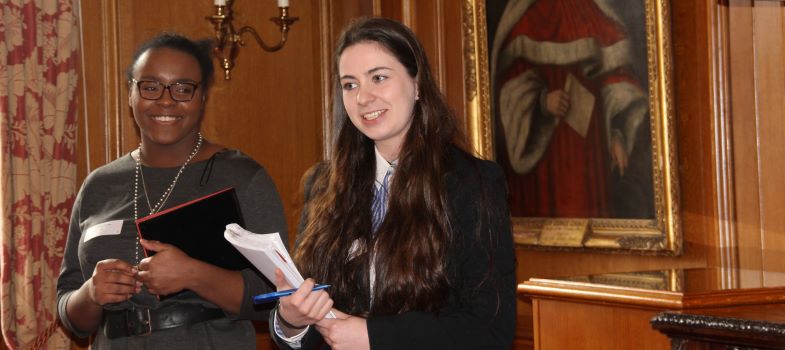Pursuing a career as a barrister – support at school
Pupils should aim to acquire the skills that will equip them in a future legal career. Being a barrister requires many skills, including:
 Good oral communication skills
Good oral communication skills
Barristers need to be able to talk to clients, solicitors, judges and many others. They are also likely to be standing up in court and speaking, so enjoying public speaking is important.
 Good written communication skills
Good written communication skills
It is not just about oral communication. Barristers need to be able to write clearly and accurately. This could involve putting complicated legal ideas into simple and straightforward language for clients and writing persuasive arguments in cases.
 Research skills
Research skills
From finding out what the law says on an issue, to investigating the best public transport to a court building, research is a big part of a barrister’s life. Much of it is done online, using legal databases and other useful sites. Being able to successfully conduct research enables barristers to find evidence to support the arguments they are making.
 Using evidence to support arguments
Using evidence to support arguments
Evidence is used rigorously to make historical claims, and discern how and why contrasting arguments and interpretations of the past have been constructed. An analytical approach to the strength and weaknesses of evidence, and in assessing arguments, are key skills for a career at the Bar.
 Skills in reading and absorbing information
Skills in reading and absorbing information
Barristers often have to read a lot of documents quickly. This could be for use in their arguments in court, to help give advice to a client, or to spot weaknesses in the other side’s case. This means it is important to be able to deal with large amounts of information, identifying the most relevant parts and understanding their value.
 Analytical skills
Analytical skills
Being able to analyse something means being able to break it into smaller parts and examine each part in detail. For example, with the statement ‘No vehicles on the grass’, you might ask what constitutes a vehicle (A car? A bicycle? A pushchair?). You might also ask whether the term ‘grass’ includes things like the neighbouring flower beds. As a barrister, when examining a client’s case, it is crucial to take this kind of detailed and questioning approach.
 Determination and motivation
Determination and motivation
Becoming a barrister is not always easy. When they get there, they also find new challenges ahead, including having to make connections to help them get work and sometimes working long hours, often into the evening and at weekends. This means it is essential to have the determination to succeed and the motivation to keep going.
The development of skills within English Language and English Literature and in other humanities subjects, including reading, improving vocabulary, making inferences, using research, and the development of writing and oral communication skills, are all key skills for a barrister. The study of history at key stage 3 in England requires that pupils can ‘understand the methods of historical enquiry, including how evidence is used rigorously to make historical claims, and discern how and why contrasting arguments and interpretations of the past have been constructed’. This analytical approach to ascertaining the strength and weaknesses of evidence, and in assessing arguments, are key skills for a career at the Bar.
A focus on specific skills
Note that some universities require that pupils undertake particular subjects, or subjects which focus on specific skills such as essay writing, within their requirements for admission to the degree course, so students should be informed or given information concerning these requirements.
Extra-curricular activities
Pupils should consider undertaking extra-curricular activities, such as joining debating societies, volunteering, or drama classes. They can be supported by their teachers and careers advisor in pursuit of these aims.
Incorporating these resources into teaching
